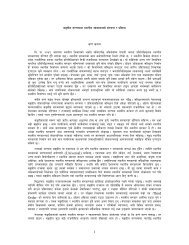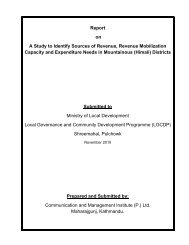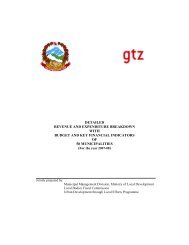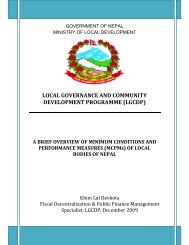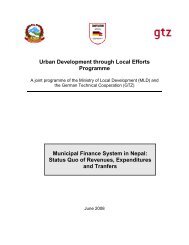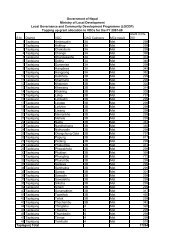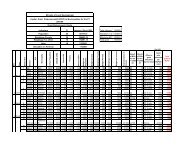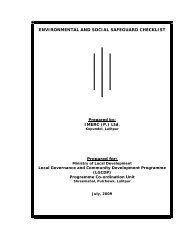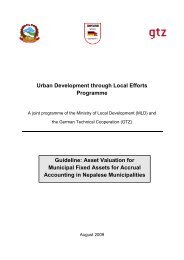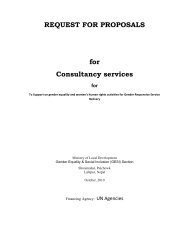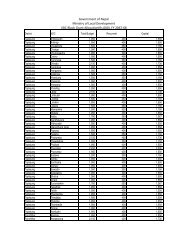GTZ Report on Accrual Accounting Status Quo - LGCDP
GTZ Report on Accrual Accounting Status Quo - LGCDP
GTZ Report on Accrual Accounting Status Quo - LGCDP
Create successful ePaper yourself
Turn your PDF publications into a flip-book with our unique Google optimized e-Paper software.
Cash <strong>Accounting</strong> vs. <strong>Accrual</strong> <strong>Accounting</strong> 12<br />
2003, p.1). This applies to more developed as well as developing countries. Mostly the nati<strong>on</strong>al level of government<br />
benefits from the experiences made by the local governments (FEE, 2007, p.6).<br />
OECD Countries<br />
Within the OECD the majority of local governments use some sort of an accrual based accounting system. This is valid<br />
for most local governments in Switzerland, the Netherlands, Sweden, Spain, Portugal, Finland, France, Great Britain,<br />
Germany, Italy, USA, New Zealand, Australia, Canada and Iceland. Also relatively new OECD members like Poland<br />
and Slovakia are in the process of accrual accounting implementati<strong>on</strong>s.<br />
In Germany for example a comprehensive municipal reform to change to accrual accounting has started in 2003 <strong>on</strong> a<br />
regi<strong>on</strong>al basis. During this reform process some of the sixteen federal regi<strong>on</strong>s made the change to accrual accounting<br />
mandatory for their municipalities. Others approved the change to accrual accounting <strong>on</strong> a voluntary basis. The fastest<br />
and broadest approach undertaken by a bigger federal regi<strong>on</strong> is being d<strong>on</strong>e by the state of North-Rhine Westphalia,<br />
which made it mandatory for all municipalities to change to accrual accounting until the end of 2009. Besides that the<br />
federal regi<strong>on</strong>s of Hamburg and Bremen already introduced accrual accounting around 2006.<br />
All in all 11 out 16 federal regi<strong>on</strong>s made it mandatory for their municipalities to introduce accrual accounting until 2013<br />
at the very latest. Five federal regi<strong>on</strong>s left the decisi<strong>on</strong> up to their municipalities whether they want to introduce accrual<br />
accounting or go for the traditi<strong>on</strong>al cash accounting system or a modified accounting system (KPMG, 2008, p.1-3).<br />
Besides these regulatory approaches there are a lot of towns and municipalities who introduced accrual accounting <strong>on</strong><br />
a voluntary basis.<br />
For further informati<strong>on</strong> <strong>on</strong> the menti<strong>on</strong>ed countries see Athukorala & Reid, 2003, p.79-81; IPSASB, 2008c; FEE, 2007,<br />
p.23-24; Grossi, 2006, p.4-5; IFAC, 2000, p.65; CESifo, 2007.<br />
<strong>Accrual</strong> accounting is part of a broad financial management reform in the public sector in the above menti<strong>on</strong>ed<br />
countries. However, they differ <strong>on</strong> the implementati<strong>on</strong> of some sort of performance budgeting, reporting and auditing<br />
but the change in accounting usually had implicati<strong>on</strong>s for these other comp<strong>on</strong>ents.<br />
N<strong>on</strong>-OECD Countries<br />
In the case of South Asia, a couple of countries implemented some sort of accrual accounting at local level or are in<br />
the process of doing so.<br />
In India for instance, some federal states including Tamil Nadu, Maharashtra, UP and Karnataka are using accrual<br />
based accounting. The urban local bodies however are more speedily towards the implementati<strong>on</strong> of accrual<br />
accounting because of a decisi<strong>on</strong> by the Supreme Court of India in 2001 that forces all urban governments to<br />
implement accrual accounting, e.g. Municipal Corporati<strong>on</strong> of Delhi since 2003 (SAFA, 2006, p.7-8).



